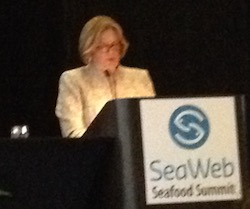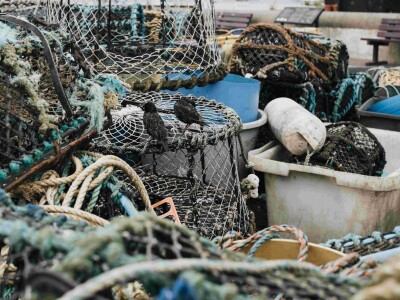NOAA administrator Dr. Kathryn D. Sullivan yesterday opened the 11th Seafood Summit, in New Orleans, underlining the scientific agency's commitment to resilience in the "lives and livelihood" of Americans. But she very quickly focused her message on an audience of 500 or more people linked by their interest in seafood.
NOAA Administrator Kathryn Sullivan talks to an audience of 500 people about U.S. aquaculture opportunities, and efforts to combat illegal, unreported and unregulated fishing and seafood fraud at the 11th Seafood Summit in New Orleans. Jerry Fraser photoSullivan, a high-achieving scientist who became an astronaut, flew on three shuttle missions and is the first woman to have walked in space, enumerated the agency's priorities as deriving information that enables it to "keep the pulse of the planet," evolving the National Weather Service "to build a weather-ready nation," and providing information and technology "to help our communities become more resilient."
Healthy fisheries and coastal communities, she said, are "central to ecological resilience."
And while NOAA may be viewed in many minds as overseeing marine fisheries in federal waters, Sullivan, who served as head of an aquaculture panel on the Pew Oceans Commission around the turn of the century, takes the broad perspective when it comes to seafood.
Half of the seafood Americans eat is produced by aquaculture, she noted, and much of that is imported. Citing the United Nations Food and Agriculture Organization's conviction that increases in the production of seafood will come from fish farming, Sullivan pointed to opportunity for U.S. enterprise. "Aquaculture is a bright spot and one we need to nurture," she said, because it offers the prospect of resilience and jobs to coastal communities.
The United States must "stop exporting jobs to countries that are more aquaculture friendly," she said.
NOAA has released a plan for the Gulf of Mexico that envisions 20 aquaculture operations developing over the next 10 years.
Sullivan serves on the presidential task force that recently released its recommendations on illegal, unreported and unregulated fishing as well as seafood fraud.
A number of countries turn a blind eye to IUU fishing, which she characterized as an "assault on global oceans," and as a result, she said, a collaborative effort by industry, conservation interests and nations fishing responsibly will be required to eliminate it. IUU fishing costs the United States billions of dollars a year, she said, and suggested that offending nations could find trade barriers imposed on their products.
She also called for traceability programs to combat seafood fraud.
At its heart, Sullivan said, NOAA is a natural science enterprise. "The cornerstone of work at NOAA is prediction," she said, and the agency's product is the kind of environmental intelligence that begins with weather, tide and current tables, satellite imagery and research.
"Demand for that kind of information continues to grow," she said.
SeaWeb, which describes its mission as transforming knowledge into action toward healthier oceans, has hosted a series of seafood summits, in the United States and elsewhere, since 2002.
In 2013, Diversified Communications, the owner of National Fisherman and the producer of the Seafood Expo brand trade events in Boston, Europe and Asia, entered into a partnership with SeaWeb to produce the Seafood Summit sustainable seafood conferences, which draw representatives from the seafood industry and conservation community from around the world.







